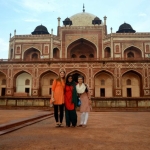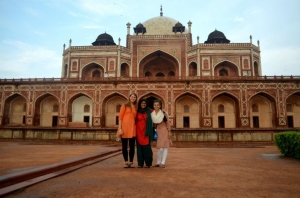| Major(s) | Biology |
| Hobbies | Traveling, everything Bollywood, Reading, Learning new languages |
| Hometown | Dallas, Texas |
| Program/Study Site | SIT Health and Human Rights in New Delhi, India |

Why did you choose India?
I had been to India several times growing up to visit family, but I always felt like a tourist, an outsider. I wanted to immerse myself in India as a student in order to begin developing my own understanding of the country. I had a semi-glorified perception of India before my time abroad, and I needed a semester on my own to uncover and interact with the realities and richness of the country. Also, the program theme and courses fit perfectly with my interests, as my Hindi desperately needed improvement and I wanted to explore public health as a potential career option.What courses did you enroll in while abroad?
SIT programs have pre-set courses that all students complete together. My program consisted of Intensive Beginners Hindi, Health and Human Rights Seminar, Field Studies Seminar, and the Independent Study Project (ISP). The Health and Human Rights Seminar was the heart of the program—I examined the complexity of the ‘right to health' and investigated the many health challenges unique to India through lecutures, workshops, and excursions to various rural communities and organizations around Northern India. The Field Studies seminar was an introduction to culturally appropriate research methodologies and ethics intended to prepare us for the ISP, in which we had the opportunity to self-design and execute a month-long study in a location of our choice. ISP was definitely one of the most transformative aspects of the program because it forced me to become much more confident and assertive, as I was responsible for every detail of the study. I conducted my ISP in Lucknow, UP on the vulnerability of different sexual minoirites to HIV/AIDS.What was your living situation?
We were each paired up with another student on the program to share a room at a home-stay. I had a wonderful host mom, dad, grandma, and two younger siblings. Indian hospitality is expressed primarily through food and feeding others, which meant we were constantly eating (no complaints there). I was in India during prime festival season, and my host-family welcomed us to share in their celebrations and included us in their traditions. Because I was not directly enrolled in an Indian university, my host-family was one of the primary ways I connected and built relationships with the local community, so I truly benefited from the living arrangement.What did you do for fun?
Ate so much delicious Indian food, haggled and shopped in the vibrant markets in Delhi, watched Bollywood movies, and traveled to the many exciting places easily accessible from Delhi (ex. the Taj Mahal, Amritsar, Jaipur). Traveling via train is very affordable and convenient in India; we took advantage of every free weekend to adventure somewhere new!Highlights of the program:
There were many, but the one that shines to me is the incredibly dedicated staff who shaped the entire program. They were not only our teachers in the classroom, but also our friends, mentors, guides, travel agents, and connections to a wide network of people, places, and organizations in India. They worked tirelessly to make sure we each had a positive immersion into India's vibrant and diverse culture. I also greatly appreciated the field-based approach of SIT. I was constantly learning about health disparities and efforts for change through directly engaging with the people and their communities during excursions and ISP. Such practical exposure and personal interactions with public health impassioned me to shape my future career in this same vein of work. In terms of everyday life, I loved the seemingly unremarkable daily activities, such as taking the metro to school, eating street food, and practicing my Hindi with my host sister.
The most challenging aspects of your experience:
Because I had visited India before, I was a bit more prepared for the adjustment and transition into Indian lifestyle and mentality. However, one aspect that can be challenging is negotiating with India's rigid gender roles and expectations, especially as a woman because it concerns your safety and wellbeing. In order to integrate into society, you want to minimize unwanted attention, which means embracing a new framework and being mindful of the way you dress and behave in public and rural settings. This can be difficult, especially for those who feel like they are comprising their independence or identity as a woman. India also is the best lesson in patience. Rarely do things go as planned or function as intended, and the only way to fully enjoy and appreciate the country without getting overwhelmed is to take a deep breath and roll with the punches. My family calls this the "chalte-chalte" attitude of India—everything goes, and you take it as it comes, with a smile.
Final comments or suggestions for future participants:
Don't go to India expecting to replicate your life in America. India has so many wonders and endless beauty to offer, but you have to approach the country with an open mind, ease and flexibility, and the willingness to dive into an experience that will challenge and change you. A year later, I am still unpacking my semester in India and scheming a way to return as soon as possible.
| Previous: Olivia in South Korea | Next: Rein in Mongolia |


